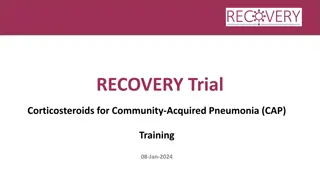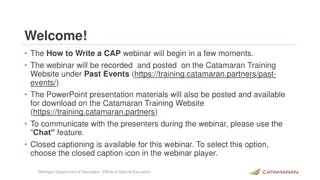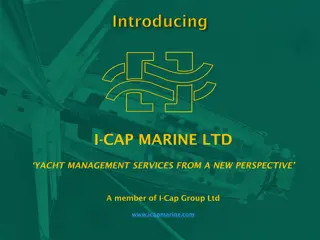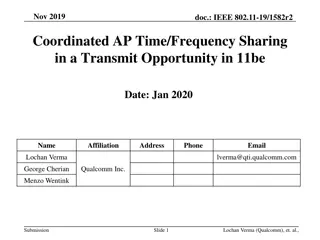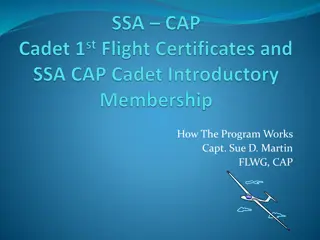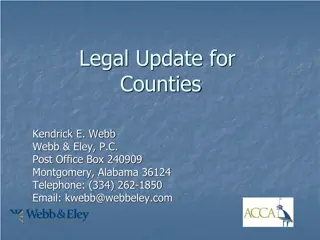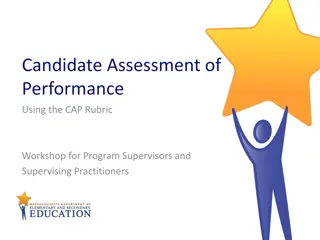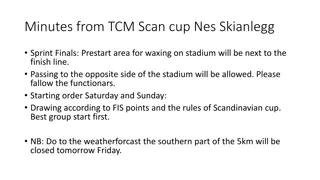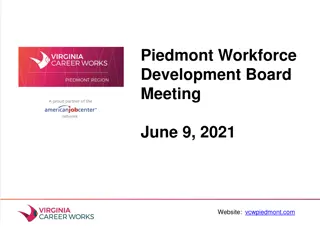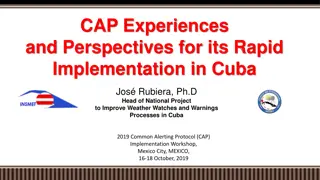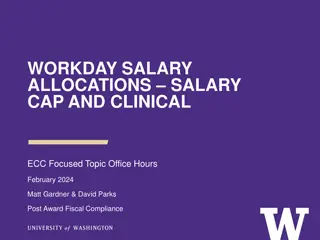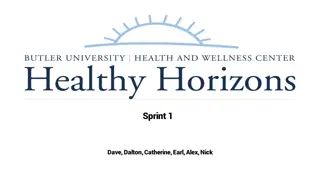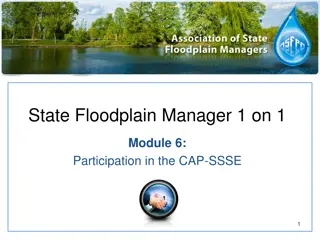CAP Strategy Sprint Update for June 2022 Board Meeting
In this update, the CAP Strategy Sprint highlights key activities and outcomes linked to an implementation plan and key performance indicators. With Gaby and Kevin leading the project, the focus is on engaging stakeholders, providing updates, and preparing strategy recommendations for the CAP Board. The strategic components aim to accelerate the transition to a low-carbon society by addressing barriers and leveraging effective methods to support municipalities in climate action implementation.
Download Presentation

Please find below an Image/Link to download the presentation.
The content on the website is provided AS IS for your information and personal use only. It may not be sold, licensed, or shared on other websites without obtaining consent from the author.If you encounter any issues during the download, it is possible that the publisher has removed the file from their server.
You are allowed to download the files provided on this website for personal or commercial use, subject to the condition that they are used lawfully. All files are the property of their respective owners.
The content on the website is provided AS IS for your information and personal use only. It may not be sold, licensed, or shared on other websites without obtaining consent from the author.
E N D
Presentation Transcript
CAP Strategy Sprint Update June 15th CAP Board Meeting
Output, Key Activities & Outcome Strategic components (with stakeholder input) linked by an implementation plan and key performance indicators Output Gaby (& Kevin) Lead and prioritize this project Engage key stakeholders as per assignments Provide periodic updates to Arete Team Lead reporting and updates to the Board Prepare strategy recommendations (to Board) and host feedback/input discussion @ Board Meetings Key Activities Provide guidance and overview of strategy component and tools Provide structure (e.g. assignments) for Gaby and Kevin to undertake to advance strategy Provide accountability and counsel Provide support for reporting and updates to the Board, retreat design and the implementation plan Identify a few champions to contribute to specific assignments (solicit commitment during meetings) Support decision-making where needed Create space for strategy discussion @ 2022 Board Meetings Undertake a retreat to identify strategic priorities, onboard new directors, and set goals, key projects and reporting Arete Initiative The Board Building strategy creation capability with Gaby (and Kevin) to lead this process on future occasions Outcome
High Level 2022 Roadmap Retreat Business Model Arete & CAP ORGANIZATIONAL STRATEGIC Establish and Align on Priorities Audience / Value Proposition Implementation Plan and Debrief Arete & CAP CAPABILITIES Theory of Change Discovery & Design Arete & CAP BOARD MTG BOARD MTG AGM BOARD MTG BOARD MTG JAN FEB MAR APR MAY JUN JUL AUG SEP OCT NOV DEC CAPABILITIES LEADERSHIP Coaching Intake GABY Coaching Modules Theory of Change Purpose: What is CAP s (evolved) purpose and theory of change? Value Proposition Purpose: Where is CAP adding value to the market? Arete & CAP Business Model Purpose: What is CAP s Business Model?
Draft TOC and Hypothesis Testing Data Insight Collection CAP s mission is to accelerate the transition toward a low carbon society. Its aspirations are that (1) municipalities have taken significant climate action implementation, and (2) that all levels of government have more aligned climate policy. 1. CAP assumes that a lack of resources is a primary barrier to increasing municipalities climate implementation actions. From your perspective, is this a significant barrier to climate implementation action worthy for CAP to address? Why / why not? 2. CAP assumes that convening municipal climate staff (e.g. Clean Air Council) will play a critical role in accelerating climate action implementation. From your perspective, is this an effective way to accelerate climate action implementation worthy for CAP to address? Why / why not? 3. CAP assumes that focusing on direct-to-municipality support (e.g. CAP as an advisor) and municipality-to- municipality support (e.g. CAP as an enabling network) is an effective focus for municipal climate staff to accelerate climate action implementation. From your perspective, is this an effective focus for CAP to advance its mission and aspirations? Why / why not? 4. CAP assumes (and has observed) that municipalities move from incremental to accelerated climate action implementation after declaring a climate emergency. However, despite a period of initial acceleration, climate action implementation loses its priority status. From your perspective, is working with Councils and Senior Leadership in municipalities that have already declared or are about to declare a climate emergency to raise the priority of climate action implementation a significant opportunity for CAP to accelerate municipal climate action implementation? Why / why not?
5. CAP has had difficulty meaningfully connecting with Councils and Senior Leadership in municipal administrations. From your perspective, what are the best ways or places for CAP to access and/or engage with this audience? CAP has also had difficulty understanding what the most important and helpful next steps would be with Councils and Senior Leadership in municipal administrations to support climate action implementation. From your perspective, what is the most important way that CAP can support this audience? CAP assumes (and has observed) that municipal, provincial (primarily ON) and federal climate policy is not aligned and is thus creating confusion and a missed opportunity for municipalities to significantly increase climate action implementation. From your perspective, is this a significant barrier to municipal climate action implementation that s worthy for CAP to address? Why / why not? CAP has had difficulty connecting with provincial and federal policymakers. From your perspective, what are the best ways or places to access and/or engage with these audiences? CAP has also had difficulty understanding what the most important and helpful next steps would be with provincial and federal policymakers to support an alignment of climate policy. From your perspective, what is the most important way that CAP can support this audience in service of its proposed mission and aspirations? 6. 7. 8. 9.
Interviewees Thus Far Name of Interviewee Mike Layton Description Toronto Councillor, Climate Champion Alex Wood Assistant Deputy Minister, Climate Change and Resiliency Division, MECP Katie Zwick Project Manager, Climate Change Mitigation, MECP Michael Hoy City of Brampton, Supervisor of Environmental Planning Dianne Zimmerman Manager, Environment, City of Mississauga Kate Daley Manager, Environment Planning and Sustainability Kevin Boyle District of Muskoka James Nolan New ED for Toronto Environment and Energy Office Manager of Sustainability, The Regional Municipality of Durham Ian McVey
Next Steps Still undertaking insight data collection May need to do more interviews if insight consistency is an issue We will have a meeting with the board team that undertook the interviews to discuss and collate top level findings Present those top level findings to the board (during a webinar in July) How those insights inform the theory of change (what is in/what is not) re CAP s value proposition to inform update to CAP strategy Business Planning stage follows TOC advancement
Seeking Board Input on the Following Questions 1. CAP assumes (and has observed) that municipal, provincial (primarily ON) and federal climate policy is not aligned and is thus creating confusion and a missed opportunity for municipalities to significantly increase climate action implementation. From your perspective, is this a significant barrier to municipal climate action implementation that s worthy for CAP to address? Why / why not? 2. CAP has had difficulty connecting with provincial and federal policymakers. From your perspective, what are the best ways or places to access and/or engage with these audiences? 3. From your perspective, what is the most important way that CAP can support this audience in service of its proposed mission and aspirations?




